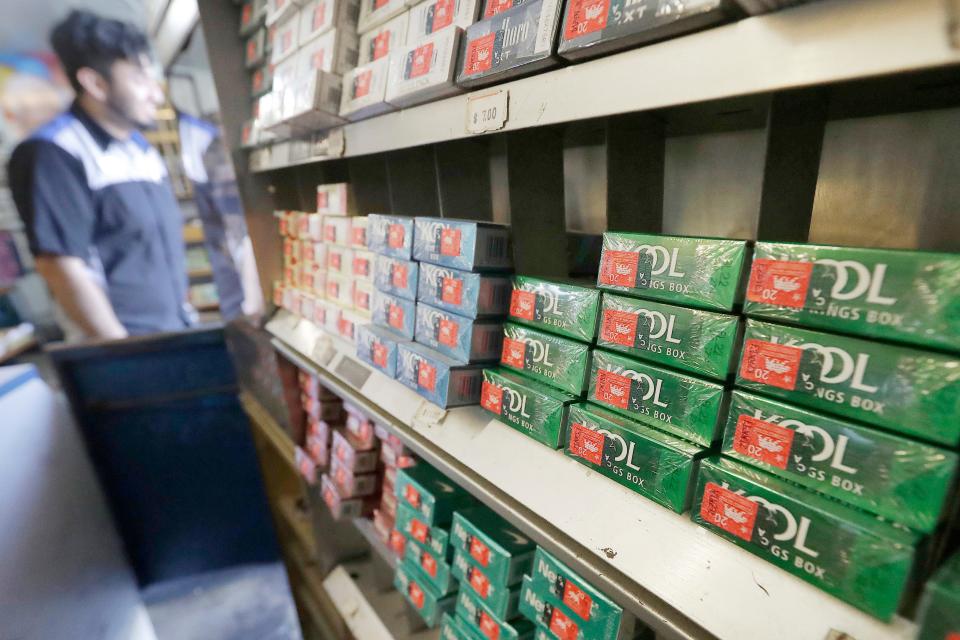With menthol cigarette ban delayed, these Americans will keep seeing the effects, data shows
The Biden Administration delayed its ban on menthol cigarettes until March, posing a major defeat for advocates who have been pushing to limit its sales for years. Menthol cigarettes can enhance the addictive effects of nicotine on the brain, making it even more difficult to quit, according to the Centers for Disease Control and Prevention.
Menthol cigarettes are aggressively marketed to Black communities and those who smoke menthol cigarettes are disproportionately Black, data shows. About 80% of Black smokers used menthols, compared to 34% of white smokers, according the Centers for Disease Control and Prevention.
The national ban on the sale of menthol cigarettes' was widely expected to be published in late 2023 or early January. Currently, California and Massachusetts restrict the sale of flavored e-cigarettes' and menthol cigarettes.
Carolyn McGruder is a Co-chair of the African American Tobacco Control Leadership Council, a public health advocacy organization. She said the tobacco industry targeted Black communities by giving away products in urban cities and through advertising and marketing tobacco products to predominantly African American communities.
Although there is no more advertising on television for tobacco products, the damage has already been done, McGruder said. "The retail density of tobacco retailers in African American communities is so high." McGruder continued, "This seeding of addiction by setting up a community norm around these products, we are still living that legacy today"
Here’s what the data shows about demographics of cigarette smokers:

Tobacco user health disparities
Although Black Americans make up about 12% of the U.S. population, they represented 40% of excess deaths due to menthol cigarette smoking, according to the CDC.
"Between 1980 and 2018, as a consequence of these products being on the market, we've had 15 million new Black smokers. We've had 157,000 premature deaths, and we've lost 1.5 million life years. And that's just Black people," said McGruder, referencing data from a report published in the BMJ.
But the use of tobacco also persists for American Indians/Alaska Natives, who have had the highest use of commercial tobacco compared to any other race or ethnicity. According to the Food and Drug Administration, within AI/AN communities, 1 in 2 young adults aged 18 to 25 years use tobacco and 1 in 5 adults aged 18 and over smoke cigarettes.
Which states already ban menthol cigarette sales?
According to the Campaign for Tobacco Free Kids, Massachusetts became the first state to restrict the sale of all flavored tobacco products, including menthol cigarettes in 2019. The following year, New Jersey, New York and Rhode Island enacted bans on the sale of flavored e-cigarettes.
California became the second state to prohibit the sale of both flavored e-cigarettes and menthol cigarettes in 2022. While Maryland and Utah prohibit the sale of some flavored E-cigs, this does not include menthol.
Disparities persist among teens who vape
E-cigarettes, commonly known as vapes, have been the most-used tobacco product by both middle and high school students for the past 10 years.
Among middle and high schoolers, 2.8 million students currently use tobacco products, or one in 10 young people. A report from the CDC highlights notable differences in the demographics of teens who vape.
Multiracial non-Hispanic students had the highest percentage of any current tobacco product use at 12.6% in 2023. Those students also had the highest vaping rate at 10.2%, among all racial and ethnic groups.
At 4.7%, Black students were more likely than other racial or ethnic groups to use combustible tobacco products such as cigars and hookahs.
Teens who vape: Tobacco use among high schoolers is going down, but increasing for middle schoolers.
"We know that tobacco is responsible for 30% of cancer deaths from 20% of cancers. And so if we can eliminate that we can, we can really dig into the health disparities that we face and the deaths that we have in our country." said McGruder.
This article originally appeared on USA TODAY: US menthol cigarette ban is delayed as health disparities persist

